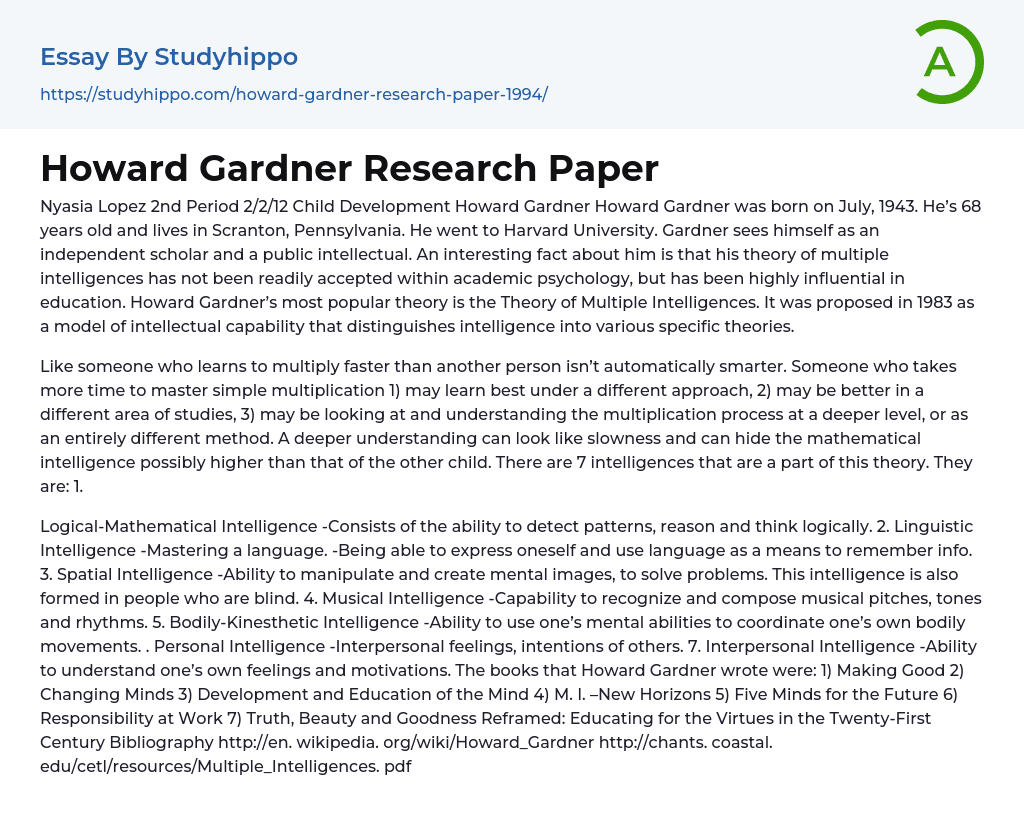Child Development
Howard Gardner
Howard Gardner was born on July, 1943. He’s 68 years old and lives in Scranton, Pennsylvania. He went to Harvard University. Gardner sees himself as an independent scholar and a public intellectual. An interesting fact about him is that his theory of multiple intelligences has not been readily accepted within academic psychology, but has been highly influential in education. Howard Gardner’s most popular theory is the Theory of Multiple Intelligences. It was proposed in 1983 as a model of intellectual capability that distinguishes intelligence into various specific theories.
Like someone who learns to multiply faster than another person isn’t automatically smarter. Someone who takes more time to master simple multiplication
- may learn best under a different approach,
- may be better in a different area of studies,
- may be looking at and understanding the multiplication process at a deeper level, or as an entirely different method.
A deeper understanding can look like slowness and can hide the mathematical intelligence possibly higher than that of the other child. There are 7 intelligences that are a part of this theory.
They are:
- Logical-Mathematical Intelligence. Consists of the ability to detect patterns, reason and think logically.
- Linguistic Intelligence -Mastering a language. Being able to express oneself and use language as a means to remember info.
- Spatial Intelligence -Ability to manipulate and create mental images, to solve problems. This intelligence is also formed in people who are blind.
- Musical Intelligence -Capability to recognize and compose musical pitches, tones and rhythms.
- Bodily-Kinesthetic Intelligence -Ability to use one’s mental abilities to coordinate one’s own bodily movements.
- Personal Intelligence -Interpersonal feelings, intentions of others.
- Interpersonal Intelligence -Ability to understand one’s own feelings and motivations.
Th
books that Howard Gardner wrote were:
- Making Good
- Changing Minds
- Development and Education of the Mind
- M. I. –New Horizons
- Five Minds for the Future
- Responsibility at Work
- Truth, Beauty and
- Goodness
Reframed Educating for the Virtues in the Twenty-First Century
Bibliography
- http://en. wikipedia. org/wiki/Howard_Gardner
- http://chants. coastal. edu/cetl/resources/Multiple_Intelligences. pdf
- Age Of Enlightenment essays
- Ethos essays
- Time essays
- Acceptance essays
- Meaning Of Life essays
- Reality essays
- Natural Law essays
- Political Philosophy essays
- Utilitarianism essays
- Existence essays
- Free Will essays
- Good And Evil essays
- Confucianism essays
- Relativism essays
- Conscience essays
- Environmentalism essays
- Empiricism essays
- Epistemology essays
- Ethics essays
- Existentialism essays
- Human Nature essays
- Individualism essays
- Metaphysics essays
- Philosophy Of Life essays
- Transcendentalism essays
- Truth essays
- Destiny essays
- Determinism essays
- Fate essays
- Functionalism essays
- Philosophers essays
- Pragmatism essays
- Future essays
- Child Observation essays
- Critical Reflection essays
- Teaching Philosophy essays
- Personal Philosophy essays
- Action Speak Louder Than Words essays
- Can Money Buy Happiness essays
- Values of Life essays
- Ethical dilemma essays
- Normative Ethics essays
- Virtue Ethics essays
- Belief essays
- Deontology essays
- Moral essays
- Virtue essays
- Work Ethic essays
- Henry David Thoreau essays
- Carl Jung essays




